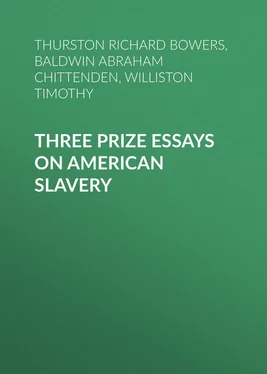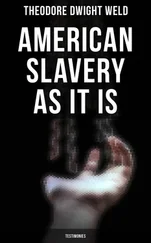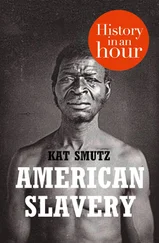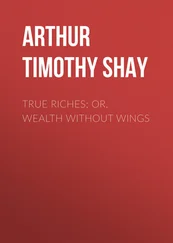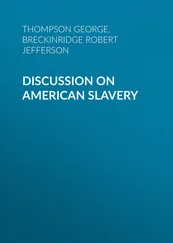Timothy Williston - Three Prize Essays on American Slavery
Здесь есть возможность читать онлайн «Timothy Williston - Three Prize Essays on American Slavery» — ознакомительный отрывок электронной книги совершенно бесплатно, а после прочтения отрывка купить полную версию. В некоторых случаях можно слушать аудио, скачать через торрент в формате fb2 и присутствует краткое содержание. ISBN: , Жанр: foreign_antique, foreign_prose, на английском языке. Описание произведения, (предисловие) а так же отзывы посетителей доступны на портале библиотеки ЛибКат.
- Название:Three Prize Essays on American Slavery
- Автор:
- Жанр:
- Год:неизвестен
- ISBN:http://www.gutenberg.org/ebooks/32422
- Рейтинг книги:5 / 5. Голосов: 1
-
Избранное:Добавить в избранное
- Отзывы:
-
Ваша оценка:
- 100
- 1
- 2
- 3
- 4
- 5
Three Prize Essays on American Slavery: краткое содержание, описание и аннотация
Предлагаем к чтению аннотацию, описание, краткое содержание или предисловие (зависит от того, что написал сам автор книги «Three Prize Essays on American Slavery»). Если вы не нашли необходимую информацию о книге — напишите в комментариях, мы постараемся отыскать её.
Three Prize Essays on American Slavery — читать онлайн ознакомительный отрывок
Ниже представлен текст книги, разбитый по страницам. Система сохранения места последней прочитанной страницы, позволяет с удобством читать онлайн бесплатно книгу «Three Prize Essays on American Slavery», без необходимости каждый раз заново искать на чём Вы остановились. Поставьте закладку, и сможете в любой момент перейти на страницу, на которой закончили чтение.
Интервал:
Закладка:
The soundness of the principle contained in these remarks, both in law and in biblical interpretation, will not be questioned. In the light of it, let us examine briefly the justifications of slavery as derived from the Bible. Happily the principle itself saves the labor of minute and protracted criticism.
We first consider the curse pronounced upon Canaan by Noah. Admitting all that is necessary to the support of slavery, namely, that that curse constituted the descendants of Canaan the property of some other tribe or people, upon whom it conferred the right of holding them as property, yet even so this passage does not justify but condemns American slavery; for that curse does not touch the African race: they are not descendants of Canaan ; 2 2 Genesis, 10th Chapter. Vide, Kitto's Cyclopædia, for views in this connection.
and it gives no rights to American States. In later times the Canaanites were devoted to destruction for their sins. The Hebrews were the agents appointed by Jehovah to this work of retribution. It was not, however, accomplished in their entire extermination. In the case of the Gibeonites it was formally commuted to servitude, and other nations occupying the promised land were made tributary. Thus the curse upon Canaan was fulfilled by authorized executioners of divine justice.
What light does the whole history now throw upon slavery? It is plain the curse was a judicial act of God concerning Canaan. It follows that conquest with extermination or servitude was a judgment of God, which he appointed his chosen people to execute. It follows further, that those, who, without his commission, reduce to bondage men who are not descendants of Canaan, do inflict a curse on those whom he has not cursed; and thus virtually assume his most awful prerogative as the Judge of guilty nations.
We then inquire whether the States of the South have received warrant for enslaving any portion of mankind. Has God given them the African race as property? Where is the commission? The argument fails to justify modern slavery for the same reason identically that it fails to justify offensive war and conquest. God has not given the right – has neither proclaimed the curse, nor commissioned the agent of the curse. Christian States in America seize it, and lay it upon those whom he has not cursed. The passage of his word which has been considered affords them no sanction.
We proceed to another passage. It is supposed by many to be an incontrovertible defence of modern slavery, that the Hebrews were authorized to buy bondmen and bondmaids of the heathen round about them. Let us candidly examine this defence.
Why were the Hebrews authorized by God in express terms to buy servants, and possess them as their "money?" Evidently because they did not otherwise have this authority . Human beings, as we have seen, were not "given" in the grant of property. They do not, therefore, fall within the scope of the general laws of property. If they had so fallen, the special statutes, by which the Hebrews purchased them, would have been as gratuitous as special enactments for buying animals, trees, and minerals. Of all nations they only have possessed this right; for they only received it by special bestowment. The rest of mankind have ever been prohibited from assuming it by fundamental laws. If ever there was a case in which the exception proves the rule, that case is before us; and therefore a chasm yawns between the premise and the conclusion defensive of slavery, which no exegesis and no logic can bridge over.
To illustrate the strength of this argument, let the fact be observed, that, if it could be set aside, it would follow, by parity of reasoning, that the clergy of our country, regardless of fundamental laws, have right to take possession of a tenth part of the estates and incomes of their fellow-citizens, because the Levites in this manner received their inheritance among their brethren. It is plain, however, that, as in regard to other interests no less important than liberty or slavery, so also in regard to slavery itself, the special laws of the Old Testament are no longer in force; whence it follows that the vital doctrine of the system, "masters have the same right to their slaves which they have to any other property," is totally erroneous. The institution which claims solid foundation here is built on nothing.
We cannot forbear to adduce an instance of unexceptionable testimony to the validity of this reasoning. In one or two famous articles on slavery and abolitionism, the Princeton Repertory adopts it, with another application, and says, "So far as polygamy and divorce were permitted under the old dispensation they were lawful, and became so by that permission; and they ceased to be lawful when that permission was withdrawn, and a new law given. That Christ did give a new law is abundantly evident." In the same manner, 'so far as' slavery 'was permitted under the old dispensation it was lawful, and became so by that permission; and it ceased to be lawful when that permission was withdrawn, and a new law given.' It is true, however, only in a qualified sense, that Christ gave "a new law" concerning polygamy and divorce. His law restored the original institution of marriage, as in Eden; and this was "new" to the Jews, because there had been departure from it. In like manner the New Testament, if not the very words of Christ, now gives a new law concerning slavery in the same sense; that is, as will appear, in the sequel, the Christian precepts restore the original institution concerning property as well as concerning marriage. The laws which allowed polygamy and slavery, and therefore the right, passed away together.
Here we leave the Old Testament. No other passages need examination; for all consist with these positions. So far as that sacred volume gives light, the world are bound by the laws and have equal right to the full blessings of three divine institutions, whose foundations were laid in Paradise, and whose complete and glorious proportions will encompass the universal, millennial felicity.
The defence of slavery from the New Testament now demands brief notice. We desire to allow it full force, while we ask the reader's candid judgment of the conclusion.
Of course, the New Testament sanctions now what it sanctioned in the days of its authors. That must have been Roman, not Hebrew , slavery; for they lived and wrote to men under Roman law. Besides, there is reason to believe, as Kitto states, that the Jews at that time held no slaves. In point of historic truth, it appears that the Mosaic law, finding slavery in existence, practically operated as a system of gradual emancipation for its extinction. "There is no evidence that Christ ever came in contact with slavery." This sufficiently explains why he did not give a "new law" concerning it in specific terms. The occasion did not arise, as it did arise in regard to polygamy and divorce, with which he did come in contact. Furthermore, there was no need of new law, other than was actually given.
The argument from the New Testament for the rightfulness of slavery is twofold, being built on the instructions given to masters and servants. It fails on both sides.
For, first, the precepts addressed to servants convey no authority to national rulers or to private individuals to set aside the institution of Jehovah by reducing men to the condition of slaves. These precepts simply enjoin the conduct which Christianity required in their actual situation. They do not vindicate the law and usage by which they were held as property. This is abundantly evident in the texts themselves, and more emphatically, when they are compared with the parallel cases.
Christ promulgated these rules. "I say unto you that ye resist not evil; but whosoever shall smite thee on thy right cheek, turn to him the other also. And if any man will sue thee at the law and take away thy coat, let him have thy cloak also." Does this empower States to legalize fraud and violence? Does it transmute all the evil which Jesus' disciples have endured into righteousness of those who have inflicted the evil? Does it wash the crimsoned hands of persecutors in innocency? Does it justify the wilful smiter? All men know better. No one contends for such exposition. Yet it is indispensable to the interpretation which finds a justification of slavery in precepts which enjoin obedience on slaves. That obedience is required on other grounds.
Читать дальшеИнтервал:
Закладка:
Похожие книги на «Three Prize Essays on American Slavery»
Представляем Вашему вниманию похожие книги на «Three Prize Essays on American Slavery» списком для выбора. Мы отобрали схожую по названию и смыслу литературу в надежде предоставить читателям больше вариантов отыскать новые, интересные, ещё непрочитанные произведения.
Обсуждение, отзывы о книге «Three Prize Essays on American Slavery» и просто собственные мнения читателей. Оставьте ваши комментарии, напишите, что Вы думаете о произведении, его смысле или главных героях. Укажите что конкретно понравилось, а что нет, и почему Вы так считаете.
